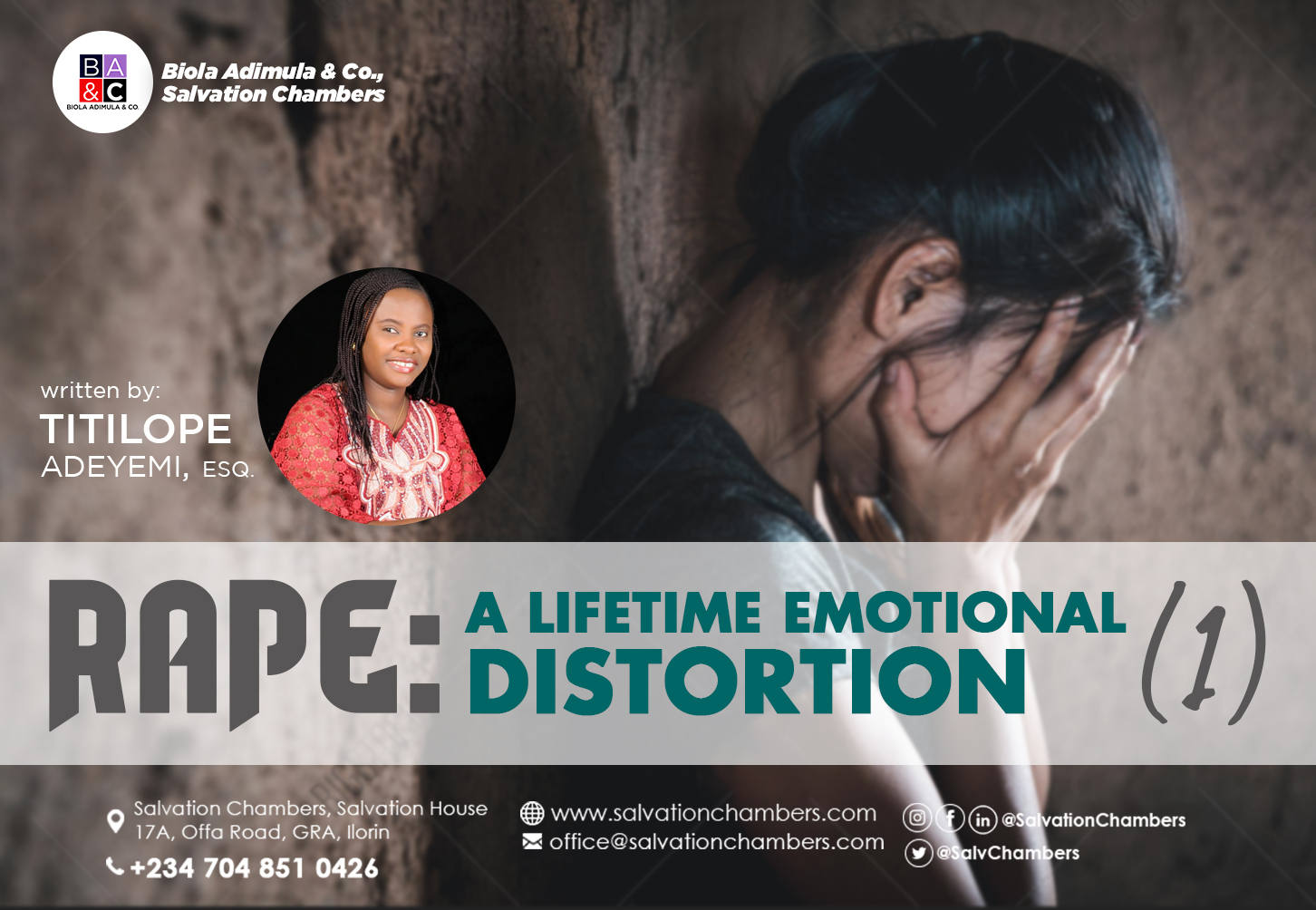BY Titilope Adeyemi, Esq
Preambles
Brutal rape cases were reported in May and June 2020: Barakat Bello was raped and killed in her home; Grace Oshiagwu, inside a church in Ibadan, Oyo State; Vera Uwa Omozuwa also raped and murdered in her church in Benin City, southern Nigeria; and another a 12-year-old girl raped by 11 men in Jigawa, northern Nigeria¹.
It was reported by the Nigerian Bureau of Statistics that “During the coronavirus lockdown, we started receiving four to seven cases of assault per day and 70% of them were related to rape.” It was also reported in a survey published by NOIPolls that one in every three girls living in Nigeria could have experienced at least one form of sexual assault by the time they reach 25².
Several activists, Media Influencers from women-led groups marched and sent a memo to Nigeria’s House of Representatives, demanding Nigeria adopt and properly implement the 2015 Violence Against Prohibition Person’s Act (VAPP). Up till now, many States in the county are yet to domesticate the law.
Nigeria declared a state of emergency on rape and sexual violence in all 36 Nigerian States. This seems to be more of media charade as a result of the prevailing situation than a strong show of intent to curb the menace.
Despite this new state of emergency, a culture of rape and impunity persists, making it difficult for victims to hold their abusers accountable. One in four girls and women will experience rape and/or sexual assault in Nigeria before the age of 18, according to the United Nations. However, there are fewer than 80 total recorded rape convictions in Nigeria.³
Shola Allyson, a Nigerian gospel singer recounted how she was abused in different ways at different stages and almost got used to it. She didn’t leave out the toll it has on her marriage even after several years. The case of Busola Dakolo is another amidst several more⁴
Meaning of Rape
Merriam-Webster defined rape as “unlawful sexual activity and usually sexual intercourse carried out forcibly or under threat of injury against a person’s will or with a person who is beneath a certain age or incapable of valid consent because of mental illness, mental deficiency, intoxication, unconsciousness, or deception”⁵.
Under the Criminal Code of Nigeria, Rape is defined, as having unlawful carnal knowledge of a woman or girl, without her consent, or with her consent, if the consent is obtained by force or by means of threats or intimidation of any kind, or by fear of harm, or by means of false act, or, in case of a married woman, by personating her husband. This offence is punishable by imprisonment for life, with or without caning.
(See Section 357 and 358 of the Criminal Code Cap “C38”, Laws of the Federation, 2004)
In plain language, in Nigeria, a person has committed rape when he has sexual relations (carnal knowledge) with a woman against her will; or
a) Without her consent or,
b) While putting her in fear of death or hurt or,
c) Misrepresenting as the husband of the woman or,
d) Having carnal knowledge of a girl under 14 years, with or without her consent or,
e) Having carnal knowledge of a girl with unsound mind.
Under the Penal Code (applicable in Northern part of Nigeria), it goes further to say even where the girl is a wife of the person, such person will be guilty of rape if she has not attained puberty.
Types of Rape
Rape can be categorized in different ways: for example, by reference to the situation in which it occurs, by the identity or characteristics of the victim, and by the identity or characteristics of the perpetrator.
1. Date rape: The term “date rape” is used to refer to several types of rape, broadly acquaintance rape, which is a non-domestic rape committed by someone who knows the victim, and drug facilitated sexual assault (DFSA), where the rapist intentionally drugs the victim with a date rape drug so that they are incapacitated.
2. Gang rape: Gang rape occurs when a group of people participate in the rape of a single victim.
3. Spousal rape: Spousal rape also known as marital rape, wife rape, husband rape, partner rape or intimate partner sexual assault (IPSA), is rape between a married or de facto couple without one spouse’s consent.
4. Rape of children: Rape of a child is a form of child sexual abuse. When committed by another child (usually older or stronger) or adolescent, it is called child-on-child sexual abuse
5. Statutory rape: It is the law citing an interest in protecting “young people” (variously defined but sometimes synonymous with minors) from sexual exploitation, treat any sexual contact with such a person as an offense (not always categorized as “rape”), even if he or she agrees to or initiates the sexual activity. Others include serial rape, prison rape etc.⁶
Several things and situations have been ascribed to causes of rape such as victim precipitation, male pathology, male hostility, indecent dressing, psychological and emotional distortions, alcohol etc. I will like to posit emphatically as there is no justification for rape.
Effects of Rape
According to (Independent Domestic Abuse Services) IDAS “The effects of rape will vary for each person as we are all affected in different ways and recover at different rates. However, working with survivors we know that there are some common responses to rape and sexual violence. We also know that the effects can last many years and can take many years to show themselves.
Here are some of the common effects:
1. Physical effects: These may be instantly obvious if the assailant has used violence during the assault and you may need immediate hospital treatment.
2. Disassociation / emotional numbness: For many an initial reaction to being raped is one of shock and emotional numbness. Many people initially feel calm and shut off from what’s happened.
3. Fear: Depending on the circumstances you may feel fear about a number of things.
4. Embarrassment & shame: A significant number of people who’ve been sexually assaulted feel embarrassed or shameful about what has happened.
5. Guilt: Feeling guilty when you’ve been raped is common. You may feel that you could have done something to prevent the attack or, if you know the attacker, you may feel that you somehow ‘provoked’ the rape.
6. Practical factors: You may feel a strong need to get away and to make practical changes in your life. Your priority should be to feel safe.
7. Depression: Depression can be expected as you start to come to terms with or recover from any major trauma or emotionally charged event.
8. Recurrent dreams and nightmares: You may experience recurrent dreams and nightmares as your brain tries to process, understand and recover from what has happened.
- To be continued- How do you help rape survivor to get justice? Recovering from rape, what are the punishment for rape, and much more in the next edition.
References
1. https://healthwise.punchng.com/rape-a-costly-lifelong-burden/
2. https://www.bbc.com/news/world-africa-52889965
3. https://globalvoices.org issue of 3rd of July, 2020
4. abused-a-lot-in-different-ways-at-different-stages-and-i-almost-got-used-to-it-gospel-singer-sola-allyson.html
5. https://www.merriam-webster.com/dictionary/rape#
6.https://en.wikipedia.org/wiki/Types_of_rapehttps://www.myjobmag.com/square/article/26/rape-under-nigerian-law

